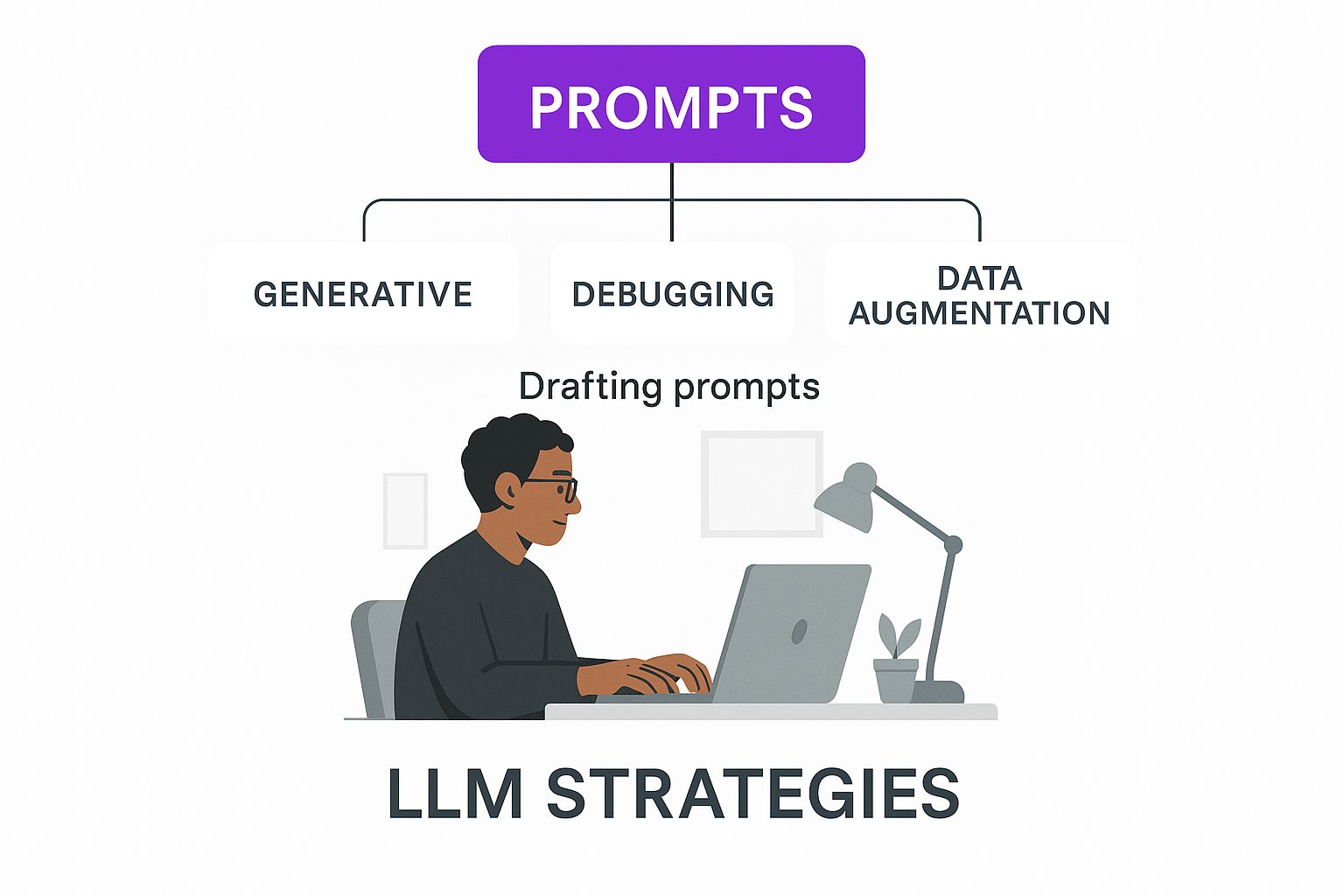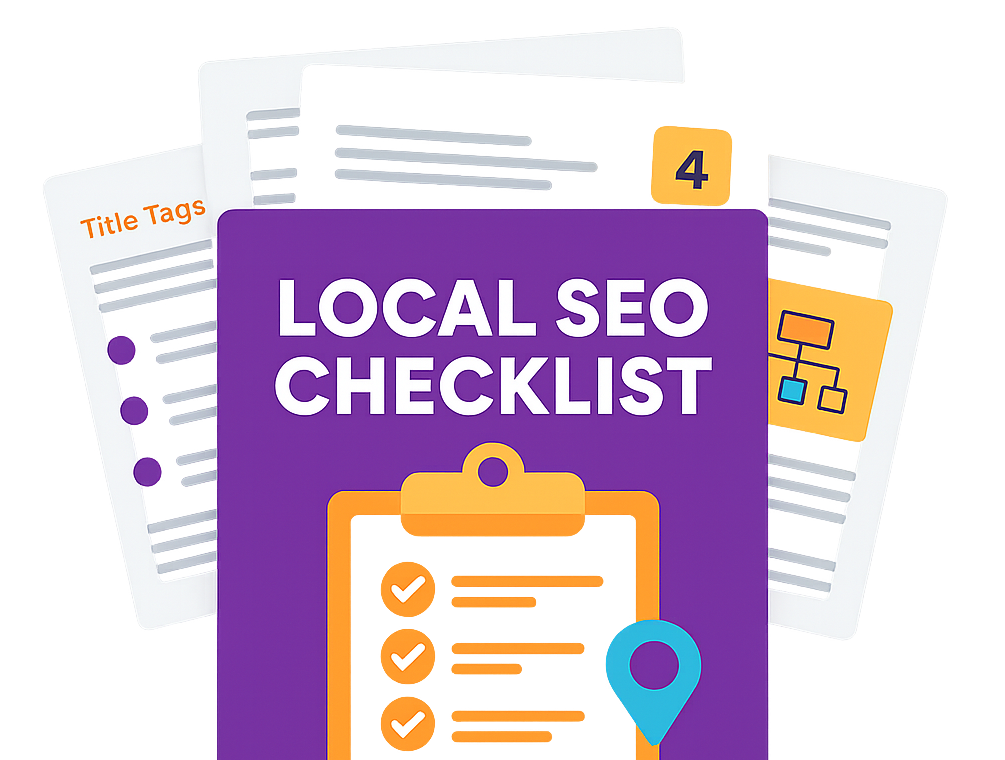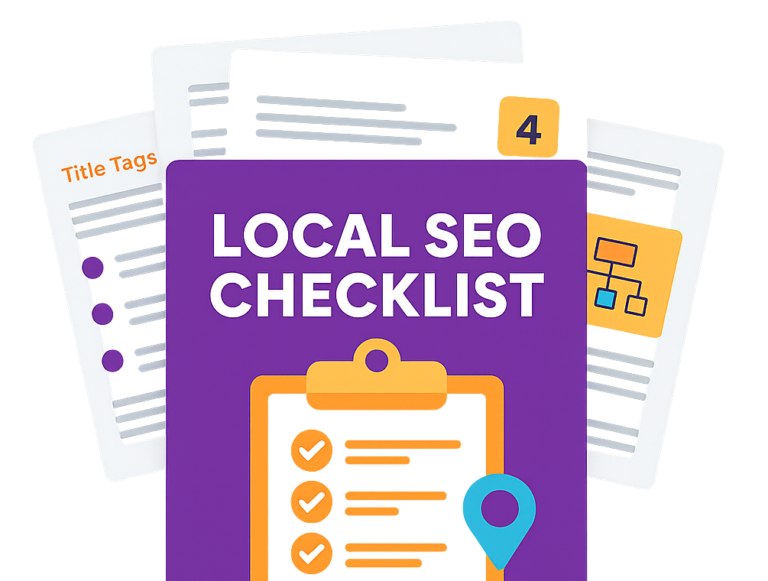Large Language Model SEO is a whole new way of thinking about optimisation. It's built for the age of AI-driven search engines like Google Gemini. The old rules of just targeting keywords are out. Now, it's all about using conversational language, going deep on topics, and proving your expertise. For any UK business that wants to stay visible as search evolves, this isn't just a trend—it's essential.
The New Reality of Search: Understanding Large Language Model SEO
Think of it this way. Traditional SEO was like walking into a library and giving the librarian a single word, like "plumbing." You’d get a mountain of books with "plumbing" in the title and be left to figure out the rest on your own.
Large Language Model SEO, or LLM SEO, is completely different. It's more like having a chat with a master plumber. You can ask something incredibly specific, like, "What are the usual causes of low water pressure in a Victorian terrace house in Cambridge?" The expert gets it. They understand the context, what you really mean, and the little details of your problem, giving you a straight, reliable answer.
This is the massive change happening in search right now. AI engines like Google's Gemini don't just hunt for keywords anymore; they understand meaning, context, and what the user is truly trying to accomplish. This puts a huge premium on your content's quality, how it's structured, and whether it’s trustworthy.
A Fundamental Change for UK Businesses
For businesses here in the UK, this isn't some far-off future concept—it's happening as we speak. The way we create and optimise our content has to adapt to this new conversational world. The goal is no longer just to rank for a term but to become the go-to source that AI models confidently cite in their direct answers.
The currency of large language models is not links. The currency of large language models is mentions—specifically, words that appear frequently near other words across the training data.
This means having a page about a topic is no longer enough. Your content needs to shout "authority" from the rooftops and be laid out in a way that an AI can easily understand and trust. We dive much deeper into this in our complete guide to LLM SEO, but the main idea is simple: be the undisputed expert in the room.
Why Conversational Content Wins
This whole shift is being driven by us, the users. We're asking search engines full questions, just like we’d ask another person. That means our content needs to anticipate these questions and answer them head-on.
- Topical Depth: You need to cover a subject from top to bottom, not just sprinkle in a few keywords.
- Natural Language: Write like a human. Use clear, conversational language that answers questions without hiding behind jargon.
- Demonstrable Trust: Your site needs to send strong signals of expertise and authority. We'll get into this concept, known as E-E-A-T (Experience, Expertise, Authoritativeness, and Trustworthiness), a bit later.
To see just how different this approach is, let's compare the old way with the new.
Traditional SEO vs LLM SEO: A Quick Comparison
The table below breaks down the key differences between the keyword-focused strategies of the past and the new conversational approach demanded by AI.
| Aspect | Traditional SEO | Large Language Model (LLM) SEO |
|---|---|---|
| Primary Focus | Keywords and backlinks | Entities, topics, and conversational answers |
| Content Goal | Rank for specific search terms | Become a citable, authoritative source for AI |
| Language Style | Often keyword-optimised | Natural, human-like, and conversational |
| Key Metric | Organic rankings and link profile | Mentions, topical authority, and clarity |
| User Intent | Matching keywords to queries | Understanding and answering complex questions |
As you can see, the game has changed. While traditional SEO fundamentals still have their place, success in the age of AI requires a much deeper, more human-centric strategy. It’s about building genuine authority, not just ticking boxes.
Why LLM Optimisation Is Crucial for Your Digital Strategy

The rise of Large Language Model SEO isn't just another industry buzzword—it's a real shift in how people find information online. For any business, ignoring this change is like choosing to be invisible. Getting your head around an LLM-first approach is now essential if you want to stay relevant and be seen as an authority.
It all boils down to a simple fact: your customers are searching differently. They’ve moved on from typing short, choppy keywords and are now asking full, conversational questions to AI assistants. If you optimise for this, you can pull in high-intent traffic straight from these new AI platforms.
When your content is set up to give clear, authoritative answers, AI models will see it as perfect material for their responses. This is the new front line of brand visibility.
Gaining Authority Through AI Citations
Getting your brand mentioned in an AI-generated answer is the new top spot on Google. It doesn't just present you as an option; it positions you as the definitive source. Think of it as an expert giving a recommendation right when a user needs it most.
This kicks off a powerful cycle. The more AI tools cite your brand, the stronger your E-E-A-T (Experience, Expertise, Authoritativeness, and Trustworthiness) signals become, which in turn makes you even more likely to be featured again.
An LLM SEO strategy is less about chasing fleeting algorithm updates and more about building a permanent library of trusted knowledge. It’s a proactive approach to becoming the answer, not just ranking for the question.
Recent UK data shows a clear pattern. Ipsos traffic reports for UK local news sites found that 70% of the top 50 city-specific news outlets, including big names like Manchester Evening News and Wales Online, saw visitor numbers grow year-over-year. This lines up with a move toward LLM SEO strategies, as these sites now structure their content to provide the comprehensive answers AI systems love, rather than just targeting keywords.
Future-Proofing Your Digital Presence
One of the best things about LLM optimisation is that it's built to last. Traditional SEO can feel like a never-ending fight against algorithm updates you can't predict. An LLM-focused strategy, however, is grounded in solid, timeless principles: quality, authority, and genuine value for the user.
By concentrating on creating the absolute best, most complete answers to your customers' questions, you're building a content library that will stay valuable no matter how the technology changes. It’s a smart way to future-proof your marketing.
The real-world benefits of making this shift are clear:
- Increased Visibility in AI Overviews: Get prime placement in AI-generated summaries, grabbing attention before users even scroll to the old-school results.
- Enhanced Brand Authority: Become the trusted source that AI models reference, building instant credibility with your audience.
- Capturing High-Intent Traffic: Attract people who are asking specific, purchase-ready questions, which means better leads and more sales.
- Long-Term Content Value: Create a durable asset that keeps performing as search tech evolves, meaning you're less reliant on short-term fixes.
Ultimately, integrating AI into your SEO practices is no longer a choice but a must-do for sustainable growth. It ensures your business doesn’t just get through the transition to AI-driven search but actually thrives in it, giving you a competitive edge that will pay off for years. The aim is to make your brand so synonymous with expertise that AI models have no choice but to point to you.
The Core Pillars of a Winning LLM SEO Strategy
Alright, let's move from theory to practice. A winning Large Language Model SEO strategy isn't built on guesswork; it rests on a few core pillars that all work together. Think of these not as optional extras, but as the absolute essentials that decide whether an AI model sees your content as a credible source or just another page on the web.
The real goal here is to shift from just ranking for keywords to becoming the definitive, citable answer for the complex questions people are asking. That requires a deliberate approach, one that’s focused on quality, clarity, and showing your expertise.
This hierarchy diagram gives a great visual of how these strategies build on one another to create a solid LLM optimisation plan.

As you can see, every piece of the puzzle, from the ground-level work on E-E-A-T to proactively managing your brand’s story, is critical to how LLMs will ultimately perceive and use your content.
Pillar 1: Fortify Your Content with E-E-A-T
If there's one thing to get right in LLM SEO, it's E-E-A-T. This stands for Experience, Expertise, Authoritativeness, and Trustworthiness. It's no longer just a vague concept from Google; it’s now a practical checklist for creating content that AI models will actually trust and reference.
LLMs are specifically designed to sniff out and prioritise information from sources that show genuine, real-world authority. They want the real deal.
LLM Optimisation (LLMO) is all about making your content easy for AI language models to understand and cite, with a heavy emphasis on E-E-A-T principles.
To really nail your LLM SEO strategy, you have to know what you're up against. Using a solid framework of competitive analysis helps you pinpoint where your competitors are winning and where you can carve out a stronger position of authority.
Pillar 2: Develop Deep Topical Authority
Surface-level articles just won't cut it anymore. They are the enemy of LLM SEO. To be seen as a true authority, you need to prove you have a comprehensive grasp of a subject. The best way to do this is by building topical authority with content clusters.
Stop thinking in terms of one-off blog posts. Instead, create a web of interconnected articles that explore a core topic from every possible angle. This structure screams "subject matter expert" to any AI that comes across your site.
Here’s a practical way to build it:
- Pillar Pages: Start with a massive, in-depth guide on a broad topic. For example, "A Complete Guide to Small Business Accounting".
- Cluster Content: Follow up with shorter, more specific articles that answer detailed questions related to your pillar. Think "How to Choose Accounting Software for a UK Startup" or "Understanding VAT for Small Businesses".
- Internal Linking: This is the glue. Strategically link your cluster articles back to the main pillar page and to each other where it makes sense.
This structure makes it incredibly easy for AI crawlers to map out the depth and breadth of your expertise, making your content a prime candidate for AI-generated answers.
Pillar 3: Implement Strategic Structured Data
While humans are great at reading between the lines, AI models need clear, direct signals to understand what your content is all about. Structured data, or schema markup, provides exactly that. It’s like putting little labels on your content that tell search engines precisely what each piece of information represents.
For LLM SEO, a couple of schema types are especially powerful:
- FAQ Schema: If you have question-and-answer sections on your pages, mark them up. This directly maps to the conversational style of user queries, making it a piece of cake for an LLM to grab your answer.
- HowTo Schema: For content that provides step-by-step instructions, use HowTo schema to outline the process. This clean, structured format is perfect for an AI to use when generating instructional guides.
Implementing structured data is a technical tweak that makes your beautifully crafted content perfectly digestible for an AI.
Pillar 4: Master Generative Engine Optimisation
The final pillar takes things beyond your own website. Generative Engine Optimisation (GEO) is about managing your brand's story across the entire web, especially on the platforms that heavily influence an LLM's training data. This means forums, review sites, and social media all play a part.
This active reputation management directly shapes how LLMs perceive and talk about your business. It's about making sure that when an AI forms an "opinion" about your brand, it's based on the accurate and positive narrative you've helped build.
Practical Steps To Implement LLM SEO in Your Workflow

Knowing you need to adapt to LLM SEO is one thing, but actually doing it is another. Putting this new approach into practice requires a clear, actionable plan, but it doesn't have to be overwhelming. By breaking it down into manageable stages, any UK business can start optimising for the conversational, AI-driven search of today.
This is all about refining what you already do. The goal is to look at your content creation through an AI-friendly lens, making your content so authoritative and well-structured that LLMs see it as a prime source for their answers. To do this well, it helps to get familiar with leading AI applications for enhanced productivity that can make content creation and analysis much smoother.
Step 1: Conduct a Content and E-E-A-T Audit
Before you create anything new, you need to take stock of what you already have. A content audit is the foundation of any good strategy, but for LLM SEO, you need to look at it from a slightly different angle.
Go through your existing pages and ask one crucial question: does this content clearly demonstrate our Experience, Expertise, Authoritativeness, and Trustworthiness (E-E-A-T)? This involves more than just checking for keywords; you’re hunting for gaps in authority.
- Review Author Bios: Are your authors clearly identified? Do their bios showcase credentials and real-world experience?
- Check for Evidence: Are you backing up claims with data, case studies, or original research?
- Assess Topical Gaps: Are there obvious questions related to your topic that you simply haven't answered?
This audit will shine a light on your weakest content, showing you exactly where to focus your efforts first. A thorough review is also a key part of any technical health check; for more on this, our technical SEO audit checklist provides a comprehensive breakdown of the essentials.
Step 2: Perform Advanced Keyword and Query Research
Traditional keyword research often revolves around finding high-volume, short-tail terms. LLM-focused research, however, is all about discovering the real questions your audience is asking. Your mission is to uncover the full, conversational queries people type or speak into AI assistants.
For Large Language Model SEO, the best "keywords" are not keywords at all; they are the complete questions your customers ask every single day.
Think beyond single terms and start hunting for question-based phrases. You can use tools like AnswerThePublic, check Google's "People Also Ask" sections, and even dig into your own customer service logs to build a list of these queries. These questions become the direct inspiration for your new content.
Step 3: Master Authoritative Content Optimisation
Once you have your target queries, it's time to create content that answers them better than anyone else. This goes beyond basic on-page SEO and into the art of crafting authoritative articles that are easy for AI to digest.
Your Optimisation Checklist:
- Write with an Authoritative Tone: Use clear, direct language. Cut the fluff and corporate jargon. Present information confidently, just like a true expert would.
- Implement Schema Markup: Use FAQ and HowTo schema to explicitly label your content for search engines. This makes it incredibly easy for an AI to grab your answers and repurpose them.
- Structure for Readability: Break down complex topics with short paragraphs, H3 subheadings, bullet points, and numbered lists. This clear structure helps both humans and AI models understand the flow of information.
Step 4: Implement a GEO and Measurement Strategy
Finally, your work isn't done when you hit "publish." You have to monitor and influence how your brand is perceived across the web—a practice known as Generative Engine Optimisation (GEO). This means keeping an eye on mentions in forums, on social media, and in reviews, as these are the very sources that help train LLMs.
Alongside this, you need to update how you measure success. While traffic is still important, new metrics are now essential for tracking Large Language Model SEO performance. Start focusing on your share of voice in AI search results and how often your brand is cited as a source in AI-generated answers. These are the new indicators of true authority.
Real-World Examples of LLM SEO in Action
Theory is great, but nothing makes a concept click quite like seeing it work in the real world. LLM SEO isn't just some abstract idea floating around in marketing meetings; it's a practical approach that businesses, big and small, are using right now to carve out a serious competitive edge.
The goal is simple: become so authoritative and helpful on a topic that AI models have no choice but to cite you as a primary source.
To show you what I mean, let's walk through a couple of scenarios. We’ll look at how a B2B tech firm and a local plumber can use these exact principles to get real, measurable results in the UK market.
Case Study 1: The B2B Tech Firm
First, picture a UK-based B2B company that sells high-end cybersecurity software. Their audience isn't your average consumer—they're talking to IT directors who ask incredibly specific, technical questions. The company's mission is to make their detailed white papers and technical guides the definitive source for AI-generated answers.
The Strategy:
Instead of chasing broad, generic keywords like "cybersecurity solutions," they've built their entire LLM SEO strategy around answering thorny, long-tail questions. They create a huge content cluster built around a central pillar page: "A Complete Guide to GDPR Compliance for UK Fintechs."
This main guide is then supported by a series of highly specific articles answering questions like:
- "What are the data residency requirements under UK GDPR?"
- "How do you conduct a data protection impact assessment for a new app?"
- "Common cybersecurity threats facing UK financial services in 2024"
Every single article is authored by their named Head of Security, whose bio is packed with credentials and experience, giving their E-E-A-T a massive boost. They also use FAQ schema on each page, which essentially hands the AI model a perfectly structured Q&A, making it incredibly easy to parse and cite.
The result? Their brand becomes the undisputed authority for any nuanced question about fintech security.
Case Study 2: The Local Service Business
Now, let's switch gears and think about a local plumbing company in London. Their customers are the complete opposite of the tech firm's. They’re stressed-out homeowners with urgent problems, typing conversational queries like, "Why is my boiler making a rattling noise?" or "How can I fix a dripping tap?"
The Strategy:
This plumbing company decides to own the local search space by becoming the most helpful, easy-to-understand resource in their area. They create a "Common Household Plumbing Problems" hub on their website.
A study found that LLMs like Google's AI Overviews can absorb new information from the web and use it in answers within 24 hours. This shows just how fast a smart content strategy can start influencing search results and building authority.
Their content is a series of simple, plain-English Q&A guides:
- Question: What causes low water pressure in a London flat?
- Answer: They offer a straightforward, step-by-step diagnostic guide, explaining everything from clogged pipes to issues with the mains supply, all without confusing jargon.
Each answer feels conversational and empathetic, speaking directly to the homeowner’s stress. They feature author bios for their senior plumbers, highlighting their years of hands-on experience fixing problems in London homes.
By answering the exact questions their customers are asking, they build incredible trust. This makes them far more likely to be featured in AI-powered local search answers, which perfectly aligns with the 2023 SEO trends that reward genuinely helpful, user-first content.
Your Top Questions About Large Language Model SEO
Jumping into this new world of search can feel like a big leap. It’s a major shift from what we’ve all been doing for years, so it's completely normal to have questions and maybe even a bit of healthy scepticism.
We get it. To help clear things up, we've put together answers to the most common questions we hear about Large Language Model SEO. The goal here is to give you straight, simple answers so you can see the opportunities clearly and tackle any practical hurdles.
Does LLM SEO Mean Traditional SEO Is Dead?
Not at all. Think of LLM SEO as a powerful new layer on top of the solid foundation of traditional SEO, not a replacement for it. All the technical stuff—like site speed, mobile-friendliness, and making sure your site is easy for search engines to crawl—is still absolutely essential.
Those technical elements create the accessible, trustworthy platform that AI models need to even find and read your content. A strong backlink profile and a sensible site structure also remain key signals of your authority.
But here’s the catch: relying only on those old tactics won't be enough to win anymore. LLM SEO adds a new, crucial focus on things like semantic context, conversational language, and showing your Expertise, Experience, Authoritativeness, and Trustworthiness (E-E-A-T). These are the signals AI models look for to understand, rank, and cite your content.
The two work hand-in-hand: traditional SEO gets you into the game, but LLM SEO is what helps you win it.
How Can a Small UK Business with a Small Budget Get Started with LLM SEO?
You don't need a massive budget or a dedicated team to get started with Large Language Model SEO. The trick is to be strategic, start small, and lean into what you already have: genuine expertise. Your authenticity is your biggest advantage.
Here's a straightforward way to begin:
- Pinpoint Your Core Customer Questions: What are the top 5-10 questions your customers ask you all the time? Jot them down. These are content gold.
- Create a Hub of Expertise: Write one incredibly detailed blog post or build out an FAQ page that answers all those questions thoroughly. Use a natural, helpful voice, just like you would if you were talking to a customer in person.
- Showcase Your E-E-A-T: Make sure your 'About Us' page and any author bios clearly spell out your credentials, qualifications, and years of real-world experience. This builds instant trust.
- Listen to Your Search Data: Use free tools like Google Search Console to see the conversational questions people are already using to find you. Then, create content that directly answers them.
When you're just starting, being consistent and authentic is far more powerful than just churning out lots of content. Your goal should be to become the single most helpful resource for a specific, narrow set of topics.
What Are the Best Metrics to Measure an LLM SEO Campaign?
Your classic metrics—organic traffic, keyword rankings, conversions—are still important, of course. But a successful LLM SEO strategy needs a new set of key performance indicators (KPIs) to give you a true picture of your influence in this new AI-driven search world.
The most important new metric is your visibility within AI-generated search results. An LLM SEO campaign's success is measured by how often your brand becomes the answer.
Here are the key metrics you need to start watching:
- Branded Mentions in AI Answers: Are LLMs citing your brand name, content, or experts as a source in their responses? This is the ultimate stamp of authority.
- 'Share of Voice' in AI Search: For your most important topics, how often does your brand show up in AI summaries versus your competitors?
- Rankings for Conversational Queries: Are you becoming more visible for those long, question-based search terms that sound like how real people talk?
- Engagement on Authority Content: Are people spending more time on your detailed, E-E-A-T-rich pages? High engagement is a huge signal of value.
Can I Use AI to Write Content for My LLM SEO Strategy?
Yes, but with a very important caveat. You can—and should—use AI tools as a brilliant assistant, but it should never be the final author. Using AI to brainstorm ideas, structure an outline, or simplify a complex topic can make your team incredibly efficient.
However, for your content to actually work for LLM SEO, it has to be filled with genuine Experience, Expertise, Authoritativeness, and Trust (E-E-A-T). Today’s AI models simply can't fake unique human insights, personal anecdotes, or the wisdom that comes from real-world experience.
The best method is a hybrid one. Let AI do the heavy lifting—the research and structuring—but always have a human expert write, edit, and fact-check the final piece. That human touch is what adds the unique value, depth, and authenticity that both users and advanced search engines are actively rewarding. Content that is 100% AI-generated feels hollow, and it will almost certainly fail to perform in the long run.
Ready to make Large Language Model SEO work for your business? At Bare Digital, we specialise in creating future-proof SEO strategies that drive real results. Get in touch today for your free SEO Health Check and see how we can elevate your online presence.








